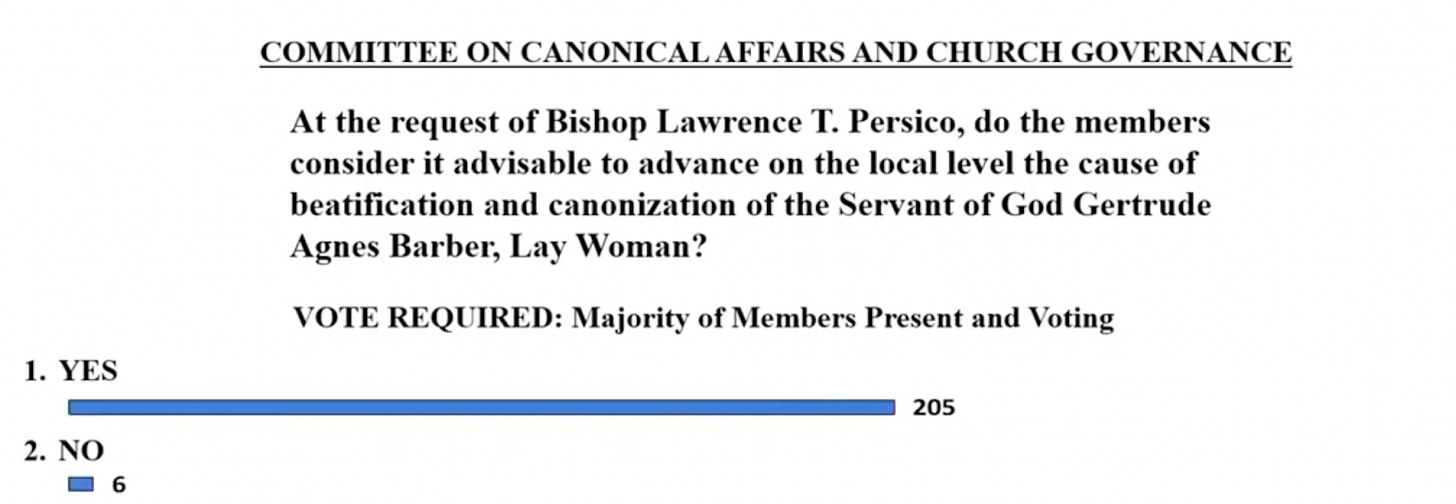Happy Friday friends,
And a real and sincere thank you to everyone who turned up for our Navy Yard live show here in D.C. last night.
When we started doing these shows a few years ago, I was a complete wreck before the first one. The place would barely hold 40 people and I don’t know what scared me more: that 40 people might come, or that nobody would.
Since then, I wouldn’t say I’ve stopped freaking out. But I am no longer worried about too many people coming. On the contrary, I’ve grown downright comfortable with the mass-parasocial familiarity that comes with being in a bar full of Pillar readers.
It’s great, because Pillar readers are great people. Sure, pretty much everyone knows who I am at these things, and I pretty much never know who anyone else is. But it’s more… weird than terrifying.
I suppose it’s probably what getting old feels like, if you have a wonderful extended family; everyone knows you and all about you, and you feel like you should know them already but can’t place any faces or names.
So, anyway, thank you so much to all of you who came last night — especially my wife, whom I never expected to see at such a thing.
Here’s the news.
The News
It was USCCB week this week, obviously. And JD and I spent most of it in Baltimore.
There were the customary opening addresses by the apostolic nuncio, Cardinal Christoph Pierre, and USCCB president Archbishop Timothy Broglio.
—
Also there in Baltimore, though he declined to come into the conference hotel hall, and instead remained outside, was former head of the Diocese of Tyler, Texas, Bishop Joseph Strickland.
Strickland addressed a small group of supporters, telling them that “Pope Francis has abdicated his responsibility to serve as the primary guardian of the Deposit of Faith,” because of pontifical statements “that are unambiguous denials of the Catholic faith.”
It was comments of that kind that saw the bishop “resigned” from his diocese last year.
Of course, some churchmen, like the former nuncio to the United States, Archbishop Carlo Maria Viganò, have gone to such extremes in their attacks on the pope that they have been charged by the Vatican and prosecuted for schism.
And, perhaps not unreasonably, a lot of people have been asking how close to that line Bishop Strickland has come with his most recent statements.
This is interesting stuff, read it all.
—
Also at the conference this week was the recently retired Archbishop of Boston, Cardinal Seán O’Malley who, while not in diocesan ministry anymore, is still very much the president of the Pontifical Commission for the Protection of Minors (PCPM).
Cardinal O’Malley sat down to talk with us in Baltimore about his time as PCPM president, the institutional pushback he has seen against the commission’s work, and what he thinks about some of the more striking findings from the commission’s recent report on Church policies and procedures for safeguarding.
For example, I asked him about the Roman practice of allowing bishops to resign from office — rather than be sacked — if they have been found guilty of misconduct.
“I think they should be fired,” the cardinal told me. “But then the question is whether they should be laicized, too.”
Strong medicine.
—
Of course, there was a lot of news happening away from the USCCB meetings, and we’ve been across that too.
The president of the Nicaraguan bishops’ conference has been exiled by the Nicaraguan regime after he criticized a pro-regime mayor during a recent Mass.
The exile comes after Herrera criticized the local mayor, Leónidas Centeno, for organizing municipal events with loud music outside of the cathedral during Sunday Mass last weekend.
—
Justin Welby stood down as Archbishop of Canterbury Tuesday, following intense criticism of his handling of an abuse case.
While not a Catholic news story, it’s still a big deal and it is going to have significant knock-on effects for Catholic-Anglican relations, depending on who succeeds him.
—
The bishops of France approved new guidelines for confession at their fall plenary assembly in Lourdes last week, including “precise directives to confessors regarding the seal” in cases of clerical abuse.
“There is no such thing as ‘conditional’ absolution, whatever the nature of the ‘condition.’” The bishops wrote. “Absolution depends on the contrition and confession expressed during the sacramental encounter.”
But the document insisted that “absolution does not exonerate the penitent from answering for his acts and their consequences,” and said that “in certain cases, and without refusing to give absolution, the confessor points out that its effectiveness requires an act of reparation to the victims.”
This is some interesting stuff, read the whole thing.
—
The number of people formally leaving the Catholic Church in Switzerland almost doubled in 2023, setting a new record, according to new statistics issued yesterday.
“Across Switzerland as a whole, the average departure rate is 2.6%,” according to the Swiss Institute for Pastoral Sociology (SPI) in St. Gallen.
—
A community of breakaway Poor Clares in Spain has welcomed (another) sedevacantist bishop, while two more sisters have left the community amid a property dispute with the local archdiocese.
The Society of St. Joseph, founded by sedevacantist bishop Rodrigo Ribeiro da Silva, announced Oct. 30 that Ribeiro was leaving Mexico to settle in Spain with the sisters and “develop his new apostolate.”
The renegade sisters have struggled to find steady (and valid) episcopal leadership since breaking with the local Archbishop of Burgos earlier this year over a real estate complaint. Theirs is an increasingly long and strange tale.
And you can follow the whole story, right here.
Need to know
I’ve been coming to bishops’ conference meetings for a few years now — long enough that they have become as fixed a point in my mental calendar as most holidays.
At some level, every meeting is different. New business, new elections, new documents, and occasionally new faces.
But there’s a definite rhythm to these sessions, not to say grim inevitability.
The coffee will be awful.
There will be a vote on the latest phase of the new breviary translations— some of us may even live long enough to see them complete.
There will be an opening address by the nuncio, and he will say the word “synodal” at least a dozen times.
And, maybe not every time, but more often than not, there will be an advisory vote on opening a local cause for a new potential saint or two. This week, the bishops heard presentations on two new prospects coming up through the farm system, and you can read all about them here.
As usual, when the assembly came to vote on the “advisability” of the new causes, they both passed nearly unanimously. But only nearly.
One of the absolute certainties of the USCCB assembly is that whenever these causes come up, from whichever diocese, man or woman, lay or cleric or religious, they’ll draw a landslide of electoral approval, but there will also be some small number who vote against them — usually around five.
Those “no” votes are the great mystery to me every conference meeting. Bishops are being asked to do nothing more dramatic than affirm in a consultative vote that looking closer at the lives of some holy people is an ok idea. That’s it. It’s the episcopal equivalent of being asked to affirm motherhood and apple pie.
But some small handful always vote no.
I badly wish I knew who they were.
Is it the same group every time? Are they some kind of self-appointed awkward squad who vote “no” on these things the way some baseball writers do on first ballot Hall of Fame prospects, because nobody should get in unanimously on the first try?
Or maybe it changes every vote, and there’s always something about every saintly prospect that just rubs a couple of guys the wrong way. Maybe there’s always one or two who just don’t like the look of that nice religious sister’s face, and that’s enough for them, you know? Maybe it’s some kind of regional rivalry, turned all the way up to 11.
It is for sure the story I want most every time we come to these meetings. And, for all our episcopal readers: If you’re one of the nay-sayers, whatever your reasons, I would LOVE to interview you about it. I will guarantee total and absolute anonymity, I won’t even quote you directly.
I just need to know.
Coffee, Kroc style
I don’t much keep up with corporate news, if I am being honest. But my wife, an omnivorous consumer of media of all kinds, informed me this week that Starbucks has a new CEO, its third in as many years, and all is far from well at the great utility company of our age.
I was surprised to hear Starbucks is doing poorly (share prices down, successive quarters of shrinking returns etc.). Outside of an airport terminal — where customer service is universally punitive, regardless of the vendor — I don’t think I have visited the Green Lady in some years.
It’s not that I don’t drink coffee; indeed, my daily intake is such that when I abstained for a good 16 hours prior to my last physical, my resting heart rate dropped to that of a zen master, it being so used to being fueled with supposedly “dangerous” amounts of caffeine.
Nor have I deprived them of my custom out of consumer activism — though I accept they are loathsome in many of the causes they support. No, I stopped stopping in because, working from home, I have access to better-quality coffee. Italian houseguests smuggle it in for me in compressed bricks, like Escobar mules.
But as my wife was running down the difficulties facing the company in recent years I was struck by two things.
The first was the insanity of some of the gimmicks they have been getting up to of late — well beyond the seasonal scented candle crap they pour out each year beginning in what feels like late August.
I read that they have, until this week, been spiking their coffee with olive oil?
I’m told this infamia was the final brainchild of their original CEO Howard Schultz, before he was hauled off by the shareholders (and the men in white coats) in 2023.
Apparently, while on holiday in Italy, Schultz encountered the local folk medicine practice of consuming a spoonful a day, picked it up for himself, and decided that since both olive oil and coffee are done to religious perfection by Italians, he would combine them in Starbucks' offerings.
Presumably, this vulgarian puts meatballs in his gelato, too. No wonder sales are on the slide.
But the second thing that surprised me, as my wife was entertaining me with the business news, was that Starbucks’ new CEO is promising a “back to basics” focus on its core retail offering. This seems like a mistake to me.
From what little I know of the company, I had assumed, perhaps naively, that they’d long outgrown the need to sell $10 caffeinated milkshakes to co-eds, which last time I visited a branch seemed to be the bulk of their trade.
Thanks to its decades of ubiquity on main streets and in malls, its most successful wheeze has long been the trade in its gift cards. At last count, there is $1.77 billion — with a B — in unredeemed gift cards out there, most of which I imagine have long been discarded or forever consigned to the back of kitchen junk drawers and the recesses of superannuated handbags.
If they’ve been plowing all this interest-free cash into pumpkin spice R&D, no wonder the finances are in free fall.
Of course, you can look at all those gift cards as a potential liability, I suppose, but really what they represent is nearly two billion bucks in interest-free deposits with Starbucks, making it, depending on what they want to be, maybe the best-capitalized bank or the most advantageously bankrolled investment fund going — much like when Ray Kroc famously realized McDonald’s was actually in the real estate business.
My wife informs me Starbucks has now recruited the CEO of Chipotle, the taco store chain, which has been going great guns of late. But I’d have thought they’d be better off getting a hedge fund manager or investment banker in to run things.
And, rather than trying to prop up a giant retail footprint and sell more coffee, I’d suggest they deliberately shrink down to operate no more than a handful of branches — thereby choking off the scope for all those cards to be cashed in, basically locking up their cash reserve and securing its use for longer-term investment.
If that sounds ruthless and ethically dubious, I remind you that this is Starbucks we’re talking about. So it would hardly be the worst thing they’ve ever done.
See you next week,
Ed. Condon
Editor
The Pillar







